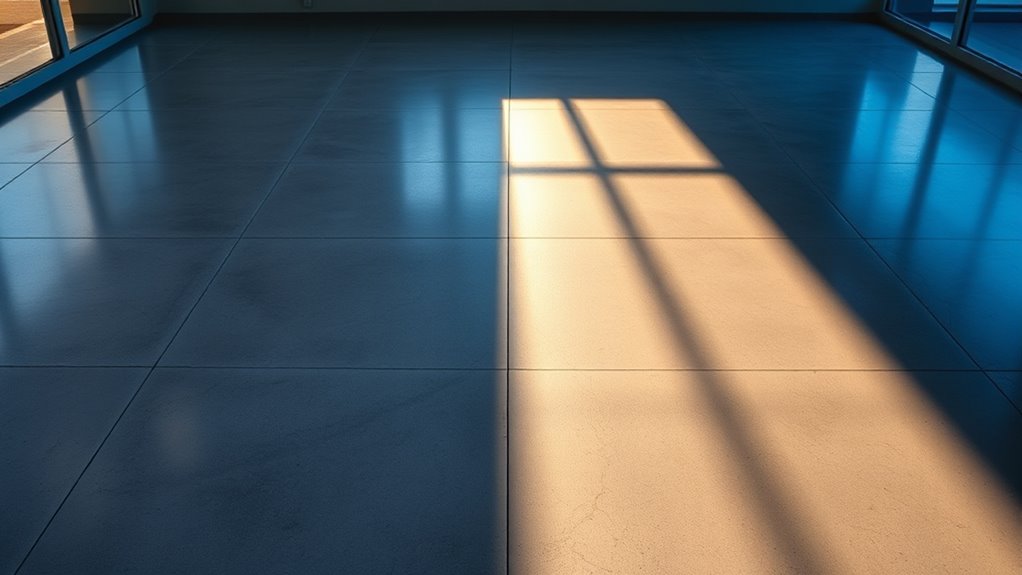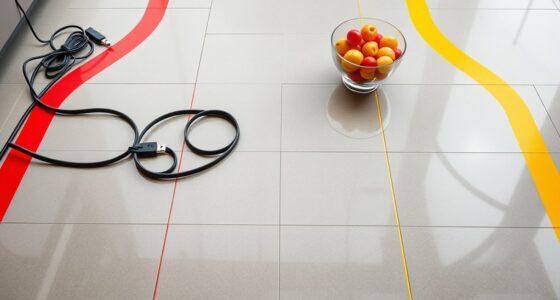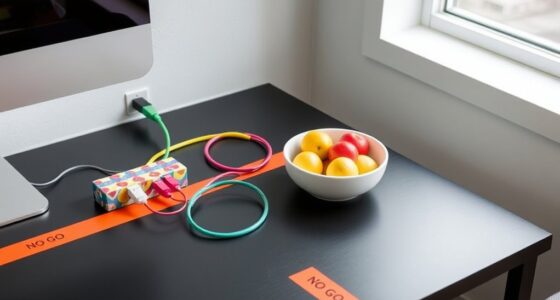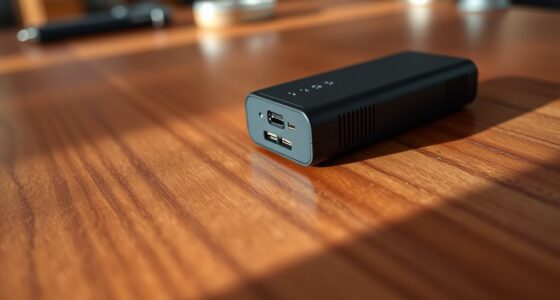Choosing between night and day scheduling for polished concrete depends on your project’s priorities. Night runs minimize disruptions, improve safety with better lighting, and benefit from cooler temperatures that help achieve higher quality finishes. Daytime work offers easier monitoring, natural light, and better collaboration with clients. Both options have safety considerations and environmental factors to weigh. To find the best approach for your project’s needs, explore key benefits and safety tips in the content ahead.
Key Takeaways
- Night runs minimize daytime disruptions but require artificial lighting and safety measures.
- Daytime scheduling offers better visibility, easier monitoring, and quicker issue resolution.
- Cooler nights improve polishing quality, while daytime work benefits from natural light.
- Environmental factors like temperature and humidity influence optimal scheduling for curing and finish.
- Large projects often favor night shifts for efficiency, whereas smaller jobs may suit daytime hours.
Advantages of Night Runs for Polished Concrete
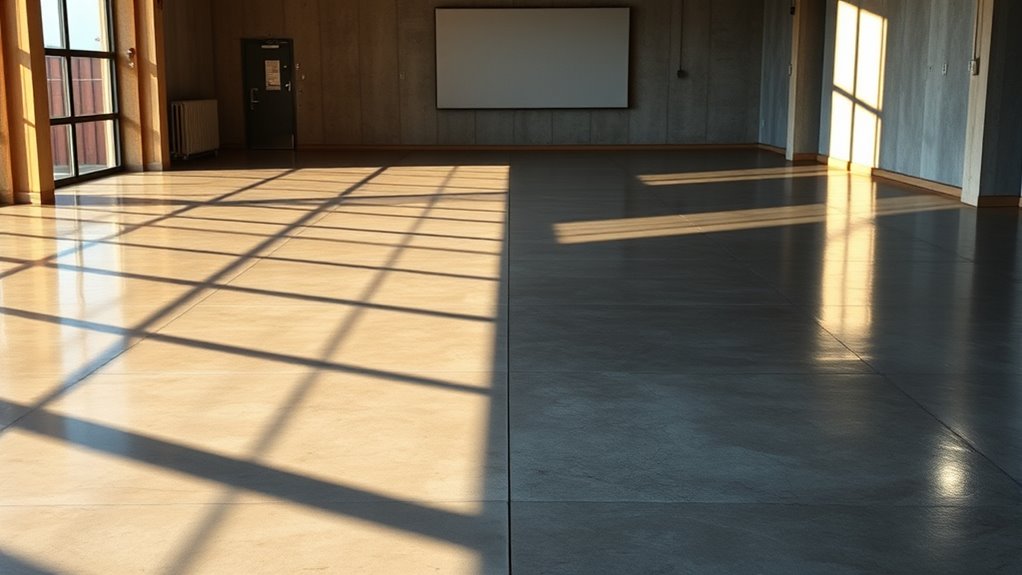
Night runs for polished concrete offer several distinct advantages, primarily related to minimizing disruptions. When you schedule work at night, you avoid interfering with daytime operations, allowing your business or daily activities to continue smoothly. This means less foot traffic and fewer interruptions, which can lead to faster project completion. Additionally, working overnight reduces safety concerns associated with daytime crowds, creating a safer environment for workers. You also benefit from cooler temperatures at night, which can improve the quality of the polishing process by reducing rapid drying or uneven results. Furthermore, scheduling at night can help you meet tight deadlines, especially in busy commercial settings, ensuring your project stays on track without disrupting your regular schedule. Incorporating proper lighting during night operations can further enhance visibility and safety for workers.
Benefits of Daytime Scheduling for Concrete Polishing
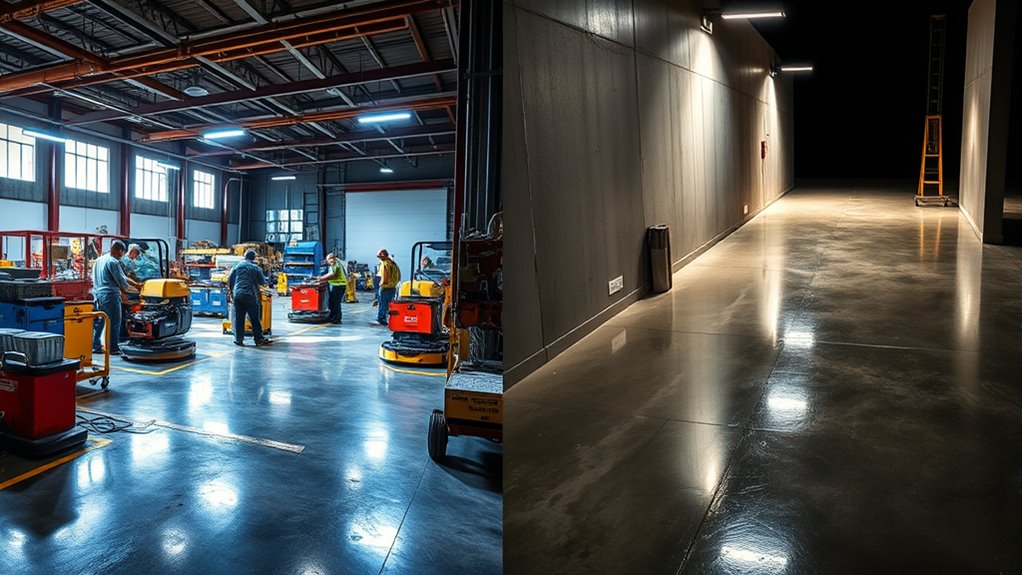
Scheduling concrete polishing during the daytime offers several key benefits, especially for projects that require coordination with other activities or access to natural light. Daytime work allows you to easily monitor progress and quickly address any issues that arise. Natural light enhances visibility, helping you achieve a more precise and even finish. Working during daylight hours also makes collaboration easier, as team members and clients can observe the process firsthand, ensuring everyone stays aligned. Additionally, scheduling during the day reduces the need for artificial lighting, saving energy and lowering costs. This approach enhances overall productivity and quality control, making it ideal for projects that demand tight coordination and high standards. Incorporating low light office plants can also improve the workspace environment, promoting well-being during long working hours. Ultimately, daytime scheduling streamlines the process and helps you deliver polished concrete efficiently.
Safety and Lighting Considerations During Night and Day Operations
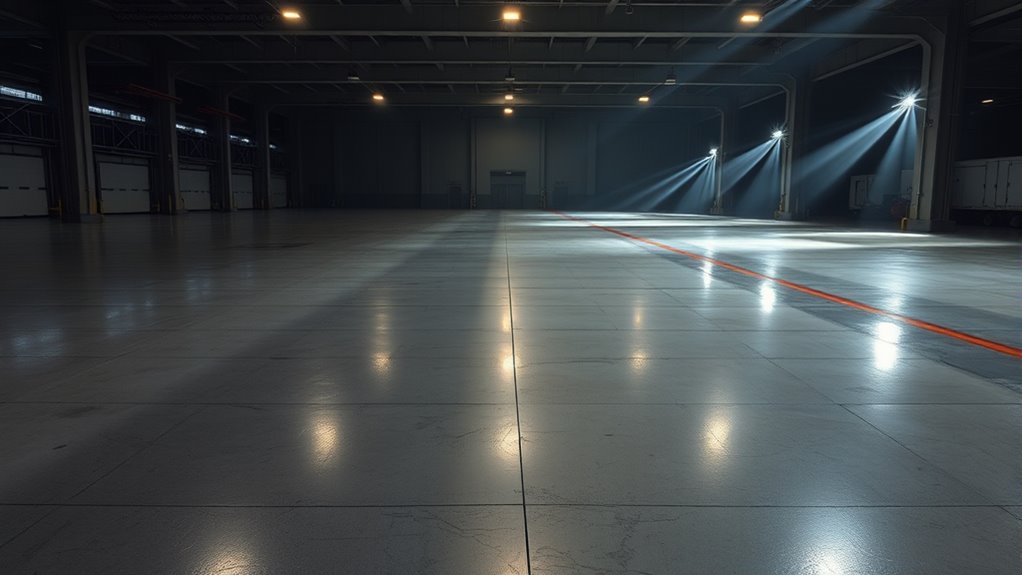
Effective safety and lighting measures are vital for maintaining quality and preventing accidents during concrete polishing, whether you work during the day or at night. During daytime operations, natural light often provides sufficient visibility, but you should still guarantee that work areas are well-lit and free of hazards. At night, proper artificial lighting is indispensable to avoid slips, trips, or equipment mishaps. Use high-intensity, broad-spectrum lights to illuminate the entire workspace adequately. Regularly inspect lighting fixtures for damage and replace bulbs promptly. Additionally, wear personal protective equipment such as eye protection, ear plugs, and durable footwear. Clear signage, barriers, and designated walkways help keep workers safe. Prioritizing safety and proper lighting minimizes risks, maintains quality, and ensures smooth, efficient polishing regardless of the time of day. Proper lighting maintenance is essential for optimal visibility and safety during night operations.
Environmental Factors Impacting Scheduling Choices
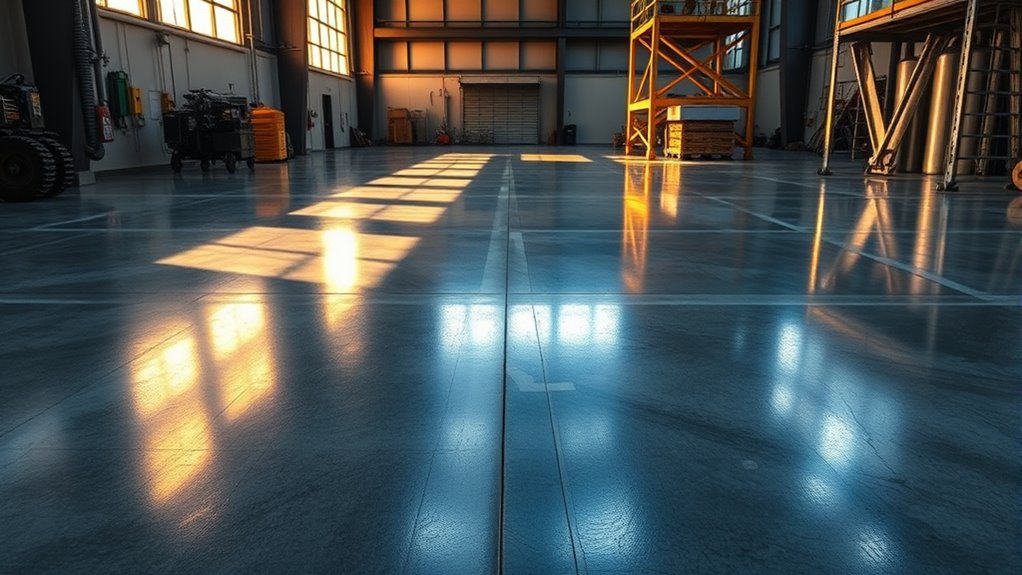
What environmental conditions should you consider when planning concrete polishing projects? Temperature plays a vital role; extreme heat can cause rapid evaporation, leading to surface cracks, while cold weather may slow curing and affect finish quality. Humidity levels also matter; high humidity can extend drying times and increase the risk of moisture-related issues, while low humidity speeds up evaporation, risking surface defects. You should evaluate air quality and dust levels, as pollutants or excessive dust can compromise the polish and health safety. Additionally, consider wind conditions, which can influence dust dispersion and drying rates. Finally, local weather patterns, such as rain or snow, impact scheduling by introducing moisture or delays. Moreover, understanding AI vulnerabilities can help in developing better safety protocols to prevent environmental hazards during projects. Accounting for these environmental factors ensures ideal results and minimizes project disruptions.
Making the Best Scheduling Decision for Your Concrete Polishing Project
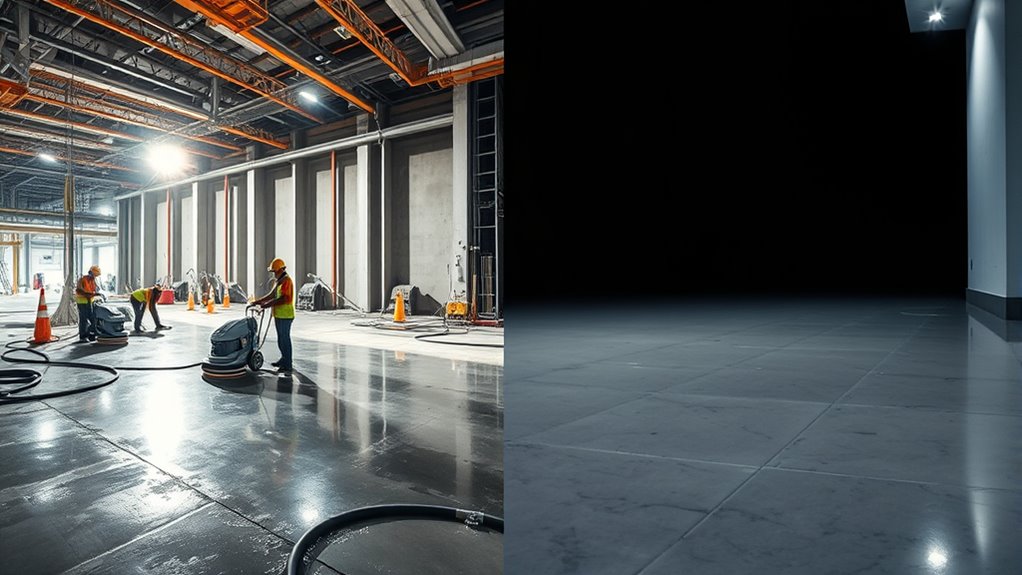
Choosing the right time to polish your concrete is essential for achieving a high-quality finish and minimizing delays. To make the best scheduling decision, consider these factors:
- Project Size and Scope: Larger projects may benefit from night shifts to avoid daytime disruptions, while smaller jobs might suit daytime work.
- Availability of Equipment and Crew: Guarantee your team and tools are available when needed, whether day or night.
- Environmental Conditions: Ascertain times with optimal temperature and humidity, which typically occur during specific hours, to ensure proper curing and finish quality.
- Proper Equipment Setup: Ensuring correct sound recording techniques and equipment setup can help in monitoring the project’s progress and quality during different times of the day.
Frequently Asked Questions
How Do Temperature Variations Affect Polishing Quality During Night vs. Day?
Temperature variations can impact polishing quality by affecting the concrete’s moisture content and curing process. During the day, warmer temperatures help the polish adhere better, leading to a smoother finish. At night, cooler temperatures may slow down curing and cause uneven surface results. You should schedule polishing during ideal temperature hours, typically in warmer parts of the day, to guarantee consistent, high-quality results regardless of whether it’s day or night.
What Are the Cost Differences Between Night and Day Polishing Schedules?
You’ll find that night polishing can save you up to 20% on labor costs due to lower wages and reduced project delays. However, day scheduling often incurs higher expenses because of increased material and equipment costs during peak hours. You should consider your project’s budget and timeline, as night work might require additional lighting and safety measures that could offset some savings. Balancing these factors helps optimize your overall costs.
Can Noise Restrictions Influence the Choice of Scheduling for Concrete Polishing?
Yes, noise restrictions can definitely influence your scheduling choices for concrete polishing. If your project is in a noise-sensitive area, you might prefer daytime runs when noise levels are more acceptable and less likely to disturb occupants or neighbors. Conversely, if noise restrictions are strict at certain hours, you may need to schedule night work, ensuring you comply with local ordinances and avoid potential delays.
How Does Scheduling Impact the Curing Process of Polished Concrete?
Think of scheduling as your concrete’s musical conductor. When you choose day or night, you set the tempo for curing. During ideal times, your concrete receives the right conditions—cool, dry, and stable—helping it cure evenly and resist cracking. If you mismatch the schedule, it’s like playing out of tune, risking delays or imperfections. Proper timing ensures your polished concrete hits all the right notes.
Are There Specific Types of Projects Better Suited for Night or Day Polishing?
Certain projects benefit more from night or day polishing based on their environment and timing needs. If noise and disruption are concerns, nighttime polishing works better for commercial or sensitive areas. Daytime polishing suits projects requiring quick completion and minimal after-hours activity. Consider factors like workspace availability, lighting, and client schedules to choose the most suitable time. Ultimately, matching project specifics with the right scheduling minimizes delays and ensures a quality finish.
Conclusion
Ultimately, choosing between night and day runs depends on your project’s priorities and environment. Night work offers flexibility and less congestion, while daytime scheduling provides better lighting and safety. Consider your space, safety needs, and environmental factors to make the best choice. Are you ready to optimize your concrete polishing schedule for efficiency and quality? Making an informed decision now guarantees smoother operations and a polished finish that lasts.
